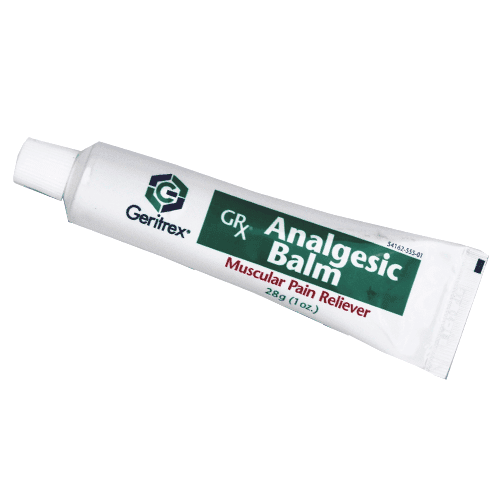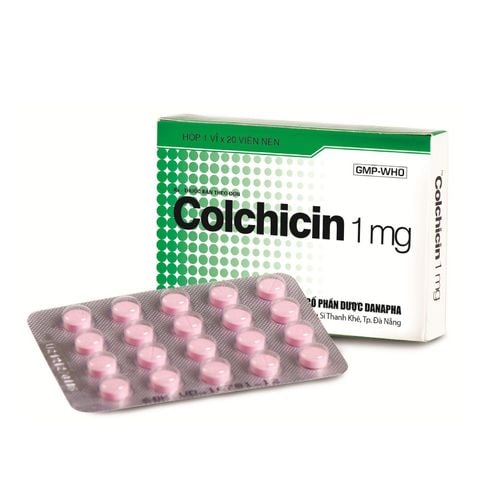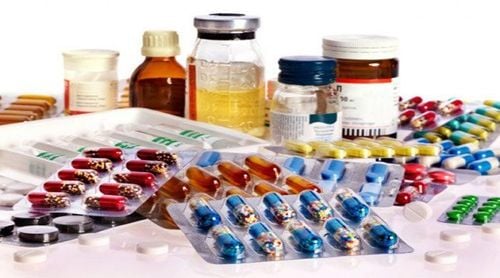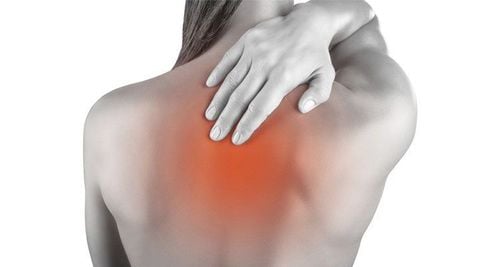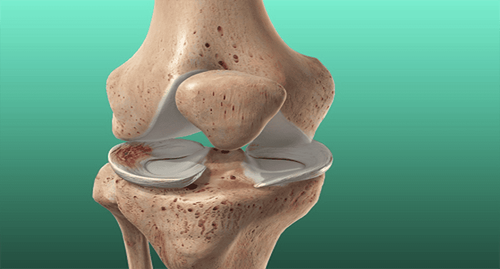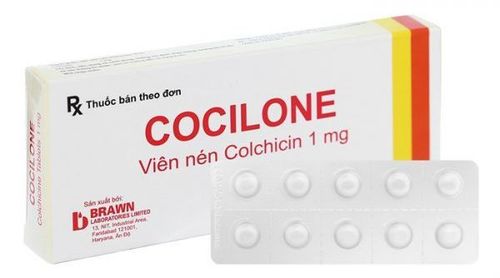This is an automatically translated article.
As a prescription drug commonly used in the treatment and prevention of gout recurrence, Colchicine has a very small gap between the therapeutic dose level and the toxic dose level, which can even be intertwined, which easily leads to overdose. So what are the consequences of an overdose of Colchicine and can this situation be prevented?
1. What is Colchicine?
Colchicin is an alkaloid isolated from Colchicum autumnale (Dog bait, leopard, narcissus, lily or autumn saffron) and Gloriosa superba (sweet) used in the treatment of gout and anti-inflammatory. Its exact mechanism of action is still not fully understood.
The effects of Colchicine include:
Effects in the treatment of gout: Colchicine is used as a gout drug due to the following mechanism: Colchicine has a special affinity for neutrophils, they are associated with binds to tubulin - a protein that makes up the microtubules of the cell skeleton, thereby inhibiting the migration of leukocytes. In addition, Colchicine can also interrupt the deposition of urate crystals in the joint tissues, thereby also suppressing the inflammatory response. However, Colchicine did not affect the excretion of uric acid in the urine, the solubility, concentration and the ability to bind to serum proteins of uric acid or urate. The anti-inflammatory effect is nonspecific and weak. Anti-mitotic effect: due to its effect on gel-sol transformation and inhibition of the middle and later stages of cell division and inhibition of gel- and sol-transformation in dormant cells. When it breaks down, Colchicine also damages other growing tissues in the body, such as skin, hair, and bone marrow. In addition, Colchicine also inhibits the respiratory center, lowers body temperature, constricts blood vessels causing hypertension.
2. In what cases is Colchicine used?
Colchicine most commonly used in gout include:
Colchicine can be indicated as a gout medicine in acute gout or acute gout flares with a dose of colchicine 1mg given early within the first 12 hours of disease onset. and in combination with other NSAIDs. But if NSAIDs cannot be used, you will take Colchicine 1mg x 3 times for the first day, Colchicine 1mg x 2 times for the second day and 1mg from the third day onwards. Colchicine is also used to prevent symptoms of gout, prevent recurrence of the disease with a dose of Colchicine 0.5-1.2 mg orally 1-2 times a day, an average of 1mg per day of colchicine lasting at least 6 month. In some cases, Colchicine can also be used to diagnose gouty arthritis (if responding to colchicine treatment indicates urate crystals) at a dose of Colchicine 1mg x 3 times per day. first 2 days. The above is the dose of Colchicine based on the guidelines for diagnosis and treatment of musculoskeletal diseases issued by the Ministry of Health in 2014, but now there are new updates in the treatment of gout to improve the effectiveness of treatment. treatment as well as reducing side effects on the patient's body, so you may be prescribed other drugs and dosages by your doctor. Colchicine for pericarditis helps to reduce swelling and inflammation in the lining of the heart.
Colchicine for familial Mediterranean fever - an inherited condition characterized by recurrent fever and possibly accompanied by inflammation (pain and swelling) in the joints, lungs or abdomen (stomach area).
Colchicine is not a pain reliever, so Colchicine should not be used to relieve pain caused by other causes.
3. Colchicine overdose
3.1 When does Colchicine overdose cause poisoning? Colchicine has a narrow therapeutic range which means that there is no clear distinction between non-toxic, toxic and lethal doses. Colchicine poisoning is mainly caused by intentional suicide. Poisoning is usually very severe and has a very high mortality rate.
Acute colchicine overdose occurs when the dose is above 0.5 mg/kg body weight and can lead to death. However, a small number of patient deaths have been reported at doses lower than only 7 mg. Patients at risk of toxicity are particularly those with hepatic impairment, renal insufficiency, those with cardiac or gastrointestinal disease, and elderly patients. Colchicine is especially toxic to children, just taking 1-2 pills can cause severe poisoning.
Colchicine overdose is very complicated and requires prompt medical advice. Symptoms of a Colchicine overdose usually have a delay of up to 6 hours before becoming apparent, and some features of toxicity may be delayed by 1 week or longer. All patients, even without initial symptoms, should be referred for immediate medical evaluation.
3.2 How does Colchicine overdose cause poisoning? Colchicine toxicity is due to the extension of its mechanism of action - binding to tubulin and disruption of the microtubule network. As a result, affected cells experience impaired protein assembly, decreased intracellular and extracellular exocytosis, altered cell morphology, decreased cell motility, and cessation of cell division, conduction, and contractility. cardiac cells are interrupted. The culmination of these mechanisms leads to dysfunction and multi-organ failure.
Colchicine has not been shown to have an adverse effect on fertility in men or women. It crosses the placenta but there is no evidence of toxicity to the fetus.
3.3 Consequences of Colchicine overdose causing poisoning Colchicine poisoning manifests in three consecutive and often overlapping phases:
Phase 1: 10-24 hours after ingestion - gastrointestinal phase: nausea, vomiting, diarrhea, abdominal pain. Diarrhea can be profuse and bloody. In addition, in some people presenting with Colchicine poisoning, there is a burning sensation in the abdomen, throat or on the skin. Phase 2: 24 hours to 7 days after ingestion - multi-organ dysfunction: tachypnea, electrolyte disturbances, shock, cardiovascular collapse, cardiac arrhythmias, marrow damage (decreased white blood cell count) ), liver damage (elevated liver enzymes, hepatomegaly), kidney damage (oliguria, hematuria), and possibly death from rapidly progressive multiorgan failure and sepsis. Delayed presentation and pre-existing renal or hepatic impairment are associated with poor prognosis. Stage 3: Recovery usually occurs within a few weeks of ingestion and is generally complete except for complications of acute illness. When detecting an overdose of Colchicine or you are using Colchicine with the above symptoms, stop the drug immediately and go to a medical facility for monitoring and appropriate treatment. There is currently no commercially available antidote to Colchicine. Intensive supportive care is the treatment of colchicine poisoning.
3.4 What to do to avoid dangerous reactions when taking Colchicine? Use Colchicine exactly as prescribed by your doctor: strictly follow the method of use, dosage, and time of taking the drug. Do not increase the dose on your own.
Do not use Colchicine to relieve pain in other diseases without a doctor's prescription.
Do not share Colchicine with others or share your medication with others.
Stop taking Colchicine immediately and see a doctor if you experience nausea, vomiting, diarrhea, epigastric pain, or a burning sensation in your abdomen, throat, or skin... as these may be these symptoms. Early warning signs of Colchicine poisoning.
Fully inform your doctor about Colchicine allergy history, medical history or symptoms of gastrointestinal, cardiovascular, liver, kidney disease.
Hopefully with the sharing of Colchicine, it will help you understand and have a better overview in the issue of drug use.
Please dial HOTLINE for more information or register for an appointment HERE. Download MyVinmec app to make appointments faster and to manage your bookings easily.




